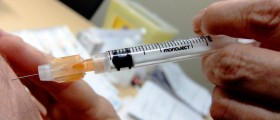
So-called "high risk" types of human papillomavirus can lead to cancer. HPV is so common that most women will have some form of HPV during their lives, but that doesn't mean you should automatically be concerned about cancer. Women with a well-functioning immune system may suppress the type of HPV they have, or eliminate it altogether. Even if you have a high-risk form of HPV, the risk of cervical cancer only looms if it is present in your body for a long time.
In the United States, 12,000 women develop cervical cancer each year, and a third of those generally die from it. But, HPV is not the only cause of cervical cancer; smoking, using the birth control pill for a long time, being infected with HIV or having other immune-system issues, and having many children are also factors.
Regular preventative healthcare can help women identify cervical cancer early on, increasing their chances of eliminating it in time. It is clear that cervical cancer can't be prevented in all cases, but there are steps every person can take to prevent being infected with a human papilloma virus or other sexually transmitted disease. The safest one doesn't appeal to many it's not having sex at all. Having a truly monogamous relationship (not just you, but your partner too!) is a close second.
Condoms can help prevent HPV, but not completely rule out infection because HPV can be present in areas not covered by condoms. Finally, vaccines that prevent the transmission of certain types of HPV, Gardasil and Cervarix, are now available as well. These vaccines are still relatively new and not every person who may be at risk of HPV chooses the vaccines, because of the potential side effects involved. If you are hoping to prevent HPV and reduce your risk of cervical cancer, these vaccines are something you may want to look into though.














_f_280x120.jpg)


Your thoughts on this
Loading...